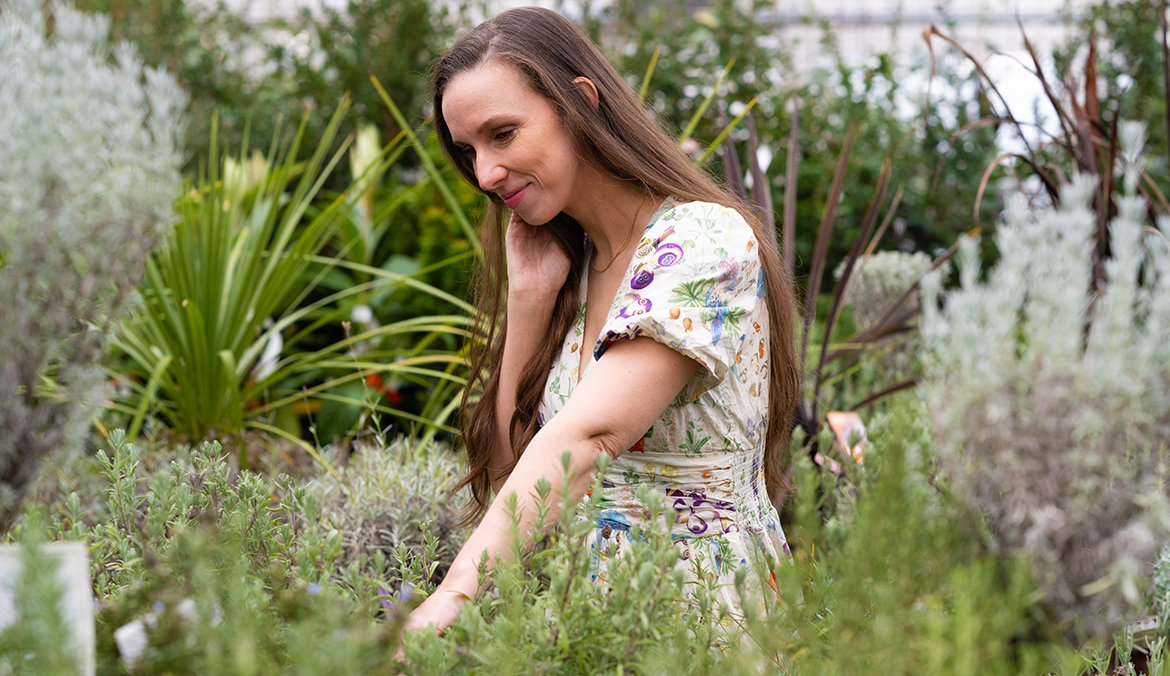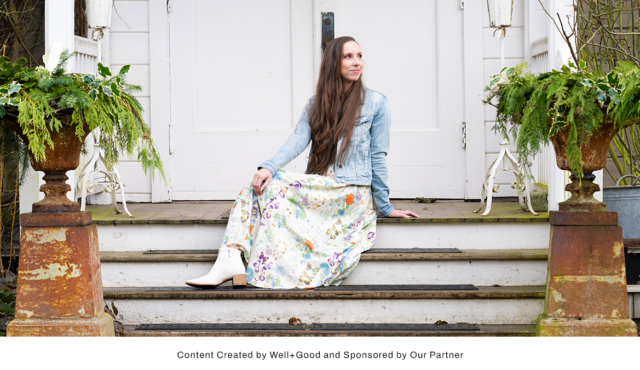If you’ve ever experienced eczema, or you know someone who has, you’re probably familiar with the physical effects of itchy, irritated skin. But the chronic condition can take a major mental toll, too—and while that mental load might not be as externally visible, it can still be heavy to hold.
Larissa Cosgrove—a mother and self-proclaimed “skinfluencer” living with chronic eczema—knows a thing or two about that struggle. Her journey began as a toddler with dry, itchy patches around her knees and elbows and continued through high school. Her symptoms escalated in early adulthood, when proximity to her college’s large agricultural program kicked her allergies into high gear and caused flares on her face and around her eyes.
From “the bone-deep itch” to feeling like her “body was covered in millions of paper cuts,” she experienced severe physical discomfort over the years—but the emotional load was just as challenging. She remembers an elementary-school pal asking if the condition was called “eggs-ema” because it looked like there were eggs laid under her skin (ah, the no-filter friend). “This is the first time I remember being self conscious about it,” she says. And there was the time an ex-boyfriend called out her “old-lady hands” in a casual conversation. “[His] words lived rent-free in my head long after that relationship ended,” she says.
“I wish people understood the anxiety that goes along with eczema.”
Those early experiences taught Cosgrove that chronic eczema impacts the mind as much as the skin. “I wish people understood the anxiety that goes along with eczema,” she says. “It [can] take a toll on your confidence, your focus, and…your mental health.”
In time, though, she’s worked to shift her perspective to a place of comfort, compassion, and confidence—and she relies on a few daily practices to help. The result? “[My mindset has] evolved from an acceptance of the condition into empowerment, [just] by listening to my body.” Check out the simple ways Cosgrove combats the mental weight of chronic eczema, and consider how they might help you lighten your own load, whatever it may be.
1. Spending time with family
For Cosgrove, quality time spent with her husband and two young kids is “truly the best medicine.” It helps keep her priorities in check and gives her “indescribable gratitude,” she says. “There is the parental pull to put their needs ahead of my own. When I’m caring for them, my skin is not at the forefront of my mind. In fact, there are days when I don’t even think about [it]!”
She’s also more aware of self talk. “I realize that our kids form their inner voices based on what they hear their parents saying,” she says. “I try to model a positive body image by not talking poorly about my skin. I would never want them to say those things about themselves, so why should I say them about myself?”
2. Stocking the house mindfully
“Eczema and flares may not be something I can control, but I can control what I put on or in my body,” Cosgrove says, and focusing on controlling the controllables is always a win for mental health. When it comes to her bathroom routine, she does her best to stick to organic skin-care and beauty products with minimal, natural ingredients that make her feel good.
And as for the kitchen? “My family primarily eats organic, homemade meals with the occasional treat from our favorite local organic coffee shop, breakfast spot, or food co-op.” This body-mind nourishment is essential in making her feel energized and strong, both physically and mentally.
3. Getting outside
Check out Cosgrove’s Instagram feed, and you’ll see lots of salt, sand, and sunshine. “Nature is healing in so many ways,” she says. “Being outdoors has the ability to shift your mindset and uplift your mood—even more so if you’re moving your body.” And she loves the health-boosting nutrients (hello, ocean minerals and vitamin D) she gets outside, too.

She commits to getting breaths of fresh air (literally and figuratively) all year long, no matter the weather. “It can be hard to get outdoors in the colder winter months, but my family does our best…even if that means visiting a local nursery, packing on layers for a walk, or taking a winter escape back to our California roots,” she says.
4. Practicing gratitude
“Finding things to be thankful for has been a great way to find clarity and put everything in perspective,” Cosgrove says. “Fixating on anything negative, be it your skin or anything else, only continues the stress cycle.” To keep her grounded and grateful, she turns to journaling, meditation, and prayer.
She feels a sense of gratitude for the community she’s found on social media, too. Initially, posting photos of her skin felt vulnerable. “I knew, though, that I wanted to document my experience…to show others they weren’t alone,” she says. “It has been so healing to connect to others going through similar challenges. The support of the community is unmatched.”

Before she goes to sleep at night, she takes a moment to reflect on all her blessings. “I say a prayer of thankfulness for the health of my family, the roof over our heads, our resources, and the memories we are making,” she says. It helps her wake up ready to take on another day with a renewed sense of confidence and compassion—and a slightly lighter load.











